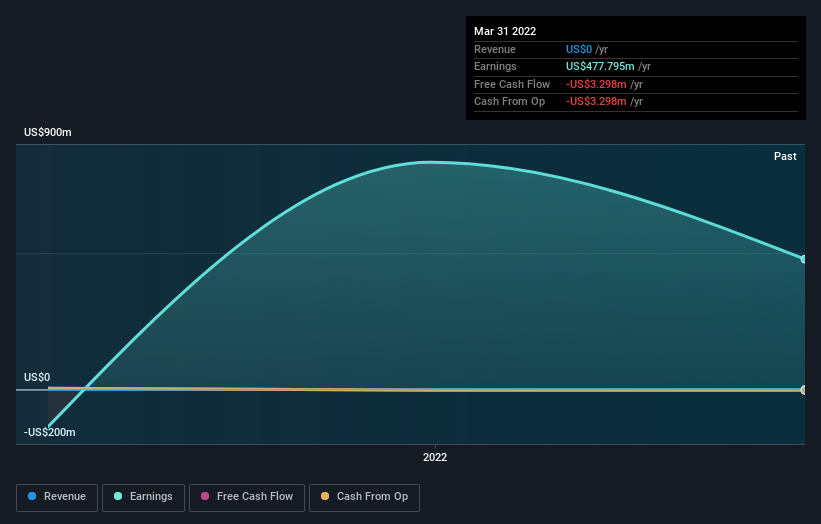How Many Pershing Square Tontine Holdings, Ltd. (NYSE:PSTH) Shares Do Institutions Own?
If you want to know who really controls Pershing Square Tontine Holdings, Ltd. (NYSE:PSTH), then you'll have to look at the makeup of its share registry. Institutions will often hold stock in bigger companies, and we expect to see insiders owning a noticeable percentage of the smaller ones. Companies that have been privatized tend to have low insider ownership.
Pershing Square Tontine Holdings is a pretty big company. It has a market capitalization of US$4.0b. Normally institutions would own a significant portion of a company this size. Taking a look at our data on the ownership groups (below), it seems that institutions own shares in the company. Let's delve deeper into each type of owner, to discover more about Pershing Square Tontine Holdings.
See our latest analysis for Pershing Square Tontine Holdings
What Does The Institutional Ownership Tell Us About Pershing Square Tontine Holdings?
Many institutions measure their performance against an index that approximates the local market. So they usually pay more attention to companies that are included in major indices.
Pershing Square Tontine Holdings already has institutions on the share registry. Indeed, they own a respectable stake in the company. This implies the analysts working for those institutions have looked at the stock and they like it. But just like anyone else, they could be wrong. If multiple institutions change their view on a stock at the same time, you could see the share price drop fast. It's therefore worth looking at Pershing Square Tontine Holdings' earnings history below. Of course, the future is what really matters.
Investors should note that institutions actually own more than half the company, so they can collectively wield significant power. Pershing Square Tontine Holdings is not owned by hedge funds. Guggenheim Partners, LLC is currently the company's largest shareholder with 11% of shares outstanding. With 5.6% and 3.3% of the shares outstanding respectively, Allspring Global Investments, LLC and Aristeia Capital, LLC are the second and third largest shareholders.
Our studies suggest that the top 25 shareholders collectively control less than half of the company's shares, meaning that the company's shares are widely disseminated and there is no dominant shareholder.
While studying institutional ownership for a company can add value to your research, it is also a good practice to research analyst recommendations to get a deeper understand of a stock's expected performance. Our information suggests that there isn't any analyst coverage of the stock, so it is probably little known.
Insider Ownership Of Pershing Square Tontine Holdings
The definition of company insiders can be subjective and does vary between jurisdictions. Our data reflects individual insiders, capturing board members at the very least. Company management run the business, but the CEO will answer to the board, even if he or she is a member of it.
I generally consider insider ownership to be a good thing. However, on some occasions it makes it more difficult for other shareholders to hold the board accountable for decisions.
Our data suggests that insiders own under 1% of Pershing Square Tontine Holdings, Ltd. in their own names. It's a big company, so even a small proportional interest can create alignment between the board and shareholders. In this case insiders own US$6.2m worth of shares. It is always good to see at least some insider ownership, but it might be worth checking if those insiders have been selling.
General Public Ownership
With a 33% ownership, the general public, mostly comprising of individual investors, have some degree of sway over Pershing Square Tontine Holdings. While this size of ownership may not be enough to sway a policy decision in their favour, they can still make a collective impact on company policies.
Next Steps:
It's always worth thinking about the different groups who own shares in a company. But to understand Pershing Square Tontine Holdings better, we need to consider many other factors. Case in point: We've spotted 3 warning signs for Pershing Square Tontine Holdings you should be aware of, and 2 of them are concerning.
Of course this may not be the best stock to buy. So take a peek at this free free list of interesting companies.
NB: Figures in this article are calculated using data from the last twelve months, which refer to the 12-month period ending on the last date of the month the financial statement is dated. This may not be consistent with full year annual report figures.
Have feedback on this article? Concerned about the content? Get in touch with us directly. Alternatively, email editorial-team (at) simplywallst.com.
This article by Simply Wall St is general in nature. We provide commentary based on historical data and analyst forecasts only using an unbiased methodology and our articles are not intended to be financial advice. It does not constitute a recommendation to buy or sell any stock, and does not take account of your objectives, or your financial situation. We aim to bring you long-term focused analysis driven by fundamental data. Note that our analysis may not factor in the latest price-sensitive company announcements or qualitative material. Simply Wall St has no position in any stocks mentioned.

 Yahoo Finance
Yahoo Finance 

